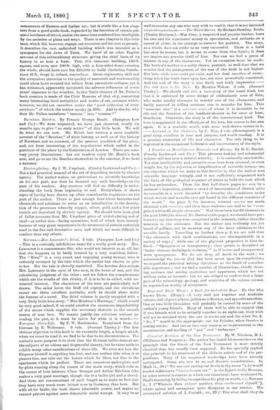NOVELS.—Mrs. Lancaster's Rival. 3 vols. (Sampson Low and Co.) —This
is a curiously infelicitous name for a really good story. Mrs. Lancaster is a consummate flirt, who would not interest us at all, but that she happens to be badly treated by a very worthless fellow. The " Rival" is a very sweet and engaging young woman, who is certainly wronged by the title which the author has chosen to give to her. But the tale is cleverly contrived. The heroine does eclipse Mrs. Lancaster in the eyes of two men, in the heart of one, and the calculating judgment of the other ; and we follow the complications which are the results of this rivalry, if it is to be so called, with un- wearied interest. The characters of the men are particularly well drawn. The sailor lover, the bluff old captain, and the chivalrous rector are three excellent portraits, such as should alone make the fortune of a novel. The third volume is partly occupied with a very lively little love-story, "Miss Monkton's Marriage," which would be very good indeed, if we could swallow the enormous improbability of the secret which supplies the necessary obstacle to the smooth course of true love. We cannot justify our criticism without re- vealing the plot, so it must be taken for what It is worth.
European Slave-Life. By F. W. Hacklander. Translated from the German by E. Woltmann. 3 vole. (Samuel Tinsley.)—The first obvious objection to this book is its excessive length, a length which, when we come to read it, we find to be due to its discursiveness. The author's main purpose is to show that the German ballet-dancers are the subjects of an odious and disgraceful slavery, but be turns aside to exhibit many other ramifications of slave-life. We even see how the Emperor himself is anything but free, and can neither ride when it so pleases him, nor take out the horses which he likes, nor dine in the apartment which he prefers. There arc numerous under-plots and by-plots running along the course of the main story, which tells us the course of love between Clara Stenger and Arthur Erichsen (she makes a very good marriage, though she is a ballet-girl and a slave). And there are conversations of such length as to make us feel that they have very mach more leisure over in Germany than here. But with all its faults, the book shows admirable power, and makes au earnest protest against some detestable social wrongs. It may be as
well to caution any one who may wish to read it, that it is not intended virginibuspuerisg ue.—The Weird Sisters. By Richard Dowling. 3 vols. (Tinsley Brothers.)—Wat Grey, a respected and popular banker, loses his own and his customers' money in speculation, and embarks on a career of crime, in the attempt to recover his position. The story, as a whole, does not strike us as very successful. There is a lurid hue over its scenes, but it seems to come from blue lights ; it does not inspire any genuine thrill of fear. Nor can we feel a grain of interest in any of the characters. Yet an exception must be made. The banker's mother is a nobly drawn portrait, so well done that we wonder that the arrangement of the rest of the book is not higher. Her love, while love could yet exist, and her final sacrifice of every- thing when the truth burst upon her, are most powerfully conceived. And the end of the story is also finely and truly impressive.— The Old Lore is the New. By Maurice Wilton. 3 vols. (Samuel Tinsley).—We should call this a love-story of the usual kind, but that it is enlivened by some doings of enthusiastic sons of Erin, who make sundry attempts to murder one of the characters, and finally succeed in killing someone else in mistake for him. This "someone else" is a mauvais sujet, of whom it is desirable to be rid, and the function of the landlord-shooter is, for once at least, beneficent. Otherwise, the story is of the conventional kind. The hero is supplanted in the affections of his love, but comes to his owu again. It is a readable novel, with some well-drawn scenes in it.
Aground in the Shallows, by C. Hay, 2 vols. (Remington), is a good story, excellent in tone and purpose, and worth reading. It is a genuine transcript of life and character. The only thing to be regretted is the occasioual feebleness and incorrectness of the style.


































 Previous page
Previous page